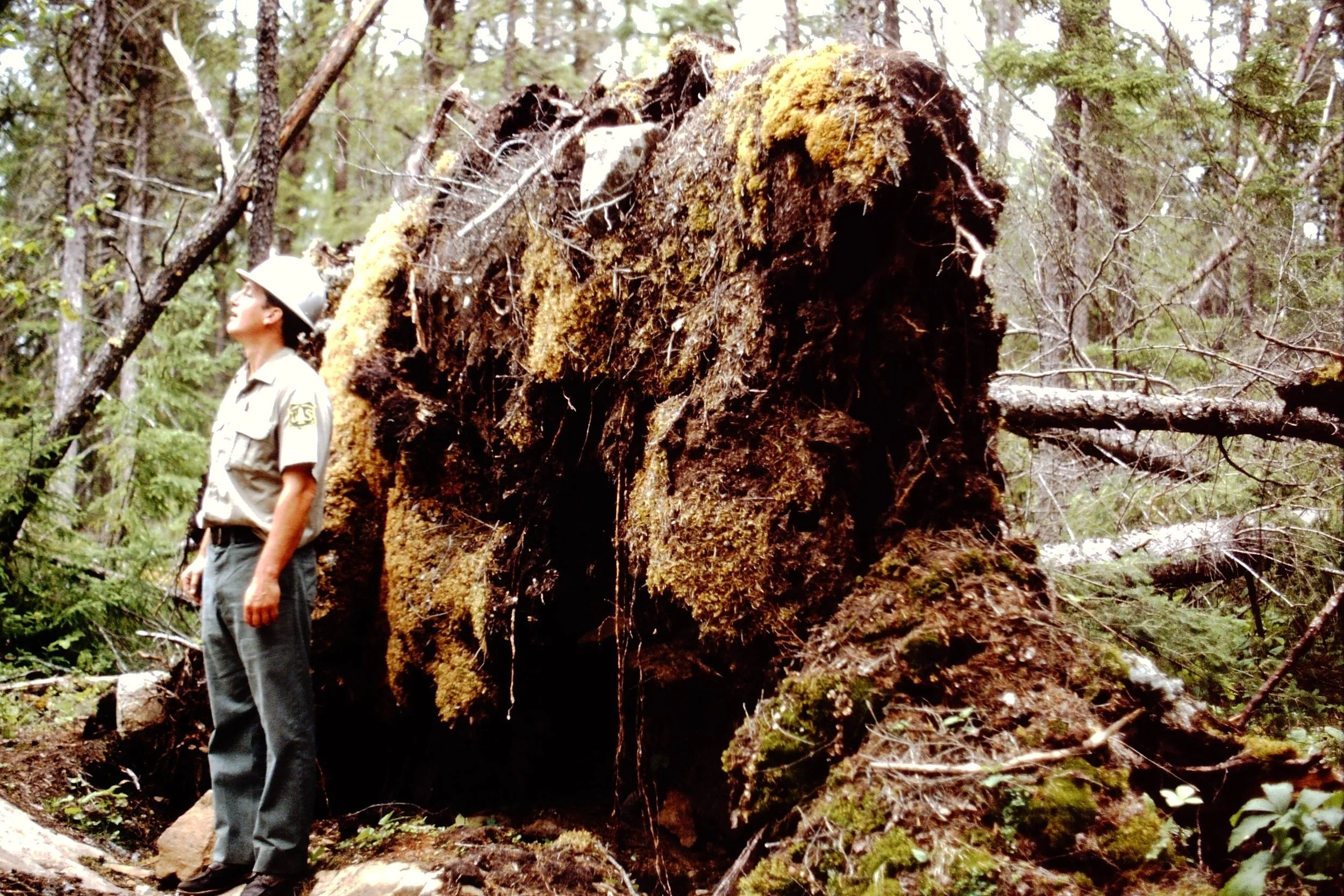Britches, Boat Rides, and Bullshit
Robert and Frances ready for a boat ride on David’s pontoon
Eventually, Mom’s Alzheimer’s whittled away my parents’ choices. We moved them from Kansas to my hometown in northern Minnesota. Mom lived in a memory care home, called Carefree. Dad shared her apartment at first. An earlier stroke had wiped out Dad’s sense of direction and left him with a milder dementia, but he couldn’t bullsh*t Mom. Life became an argument:
“Frances, our kids are all grown and have kids of their own. We don’t have any kids here.”
“Yes, we do! And those people have them locked in a room. You have to help me get them out!”
“Frances, you are confused. You have the Alzheimer’s.”
“Robert, YOU have Alzheimer’s. Not me.”
Living with Mom in Carefree was anything but carefree for him. Besides, they served tuna at least twice a week. After eight months, he moved in with me.
A Comedy of Britches
I worked in town and lived twelve miles out in the woods. One day I called Dad as I was leaving work. He told me he’d gone to visit Mom and she wouldn’t let him leave without her. They were both at my house. I dashed home.
They were on the deck. Mom was wearing a light wool turtleneck. My favorite winter shirt. In July. Then I noticed my new Patagonia pants fit her well. I’d only worn them once. Just as many times as she had.
We ate left-over pizza. David, my boyfriend, called and offered a pontoon boat ride. I stuffed Mom’s things into her bag. Then Dad disappeared into his room and took a very long time changing his pants. I called through the door, “Dad you don’t have to wear a tuxedo. What’s taking so long?” Sometimes he moved so slowly I wanted to scream.
When he came out, I hustled them both into the car and dashed a mile down the road to David’s cabin. David came up from the dock to carry Dad’s tacklebox. Ever the southern gentleman, he offered Mom his arm. Dad carried his own pole. I tailgated Dad down the path, both wanting him to move faster and fearful he’d fall on the uneven ground.
Mom and Dad settled onto one of the padded bench seats of David’s pontoon boat. David motored through the water lilies crowding the shallow water around his dock, then drove to the opposite side of the bay. When we got there, Dad stood up to cast his line off the other side of the boat. I looked at the pockets of the jeans he had on. He’d bought three new pairs of jeans with big ropey belts. They fit his skinny little butt. He was pleased and he liked the belts. I think he thought they were fashionable. I didn’t have the heart to tell my tiny but fierce dad they were women’s jeans. I looked again at the pockets. They looked familiar. He was wearing MY jeans—my favorite pair.
Then, even though David wasn’t wearing any of my pants (he was a foot taller), I got frustrated with him, too. A retired Army helicopter pilot, he commanded everything he drove whether it was by air, land, or sea. Dad’s idea of a boat ride was motoring to a likely fishing spot and dropping anchor. David had no patience for fishing. He made a few quick passes of the point Dad wanted to work, then ignored Dad’s request to get closer and motored out of the bay. We puttered along the winking lane the late sun laid among the islands. I’m no fisherwoman. Tooling among the islands was my preference, too. And David owned the boat. But sometimes I felt like a serpentine belt on an engine, pulled too tight, spinning between opposing forces.
Dad gave up, tossed his worm overboard, and soon he drowsed against Mom’s shoulder. Mom enjoyed supporting Dad and being on the lake calmed her. Finally, I slid onto the Captain’s bench beside David and he put his arm around my shoulders. I told him I’d run Mom home and he offered to give Dad a ride up to my house.
As we landed, I lured Mom away by saying that Dad and David wanted some guy-time to fish. Dad couldn’t lie to Mom, but I lied to her all the time. When we got into town, I pulled into the grocery store lot. I wanted to bring back a treat for staff and residents of Carefree. Mom’s things were in a bag in the back, but I realized I hadn’t grabbed my purse. I searched my pockets for money. Mom reached into my pocket, which she was wearing, and pulled out a small wad of cash.
My mother, raised on a dairy farm in the panhandle of Texas during the Dust Bowl days, worked a one-dollar bill loose and gave it to me with the air she used when she was tearing sticks of Wrigley gum in half to dole out to her five kids. But the money came out of my pants. It was mine. I thanked her for the one then reached over and snatched a five-dollar bill from her clutch. Mom gave me the Evil Eye and swung her hands farther away from me. She rolled the rest of the money up tightly and slid it back into the pocket. “That’s enough,” she said.
Frequently, Mom and the other residents of Carefree mixed their clothes up. When I dropped Mom off, I was determined to get my clothes back, so I walked her down to her room to change into her pajamas. She balked again and again—saying she should come with me to take care of the kids. There were no kids, but I wasn’t going to argue. Finally, I said, “Mom I need you to get into your pajamas so you can give me my clothes back.” She continued her resistance, but gave in when I promised to bring the kids back if they weren’t sleeping yet. I piled on the bullshit. “There won’t be room in the car for me to take you with me if I’m going to bring all the kids back here.” She chattered the whole time she undressed and slowly, slowly buttoned up her pajama top.
I hoped she wouldn’t want to go to the lobby in her pajamas, but she insisted on escorting me to the door. She launched into another story as I punched in the code to open the door. The code timed out and clicked locked again. “Mom, the longer we stand here talking, the more likely the kids will be in bed by the time I get there. If they’re in bed, I won’t wake them up to bring them here.” She stepped back and waved me out.
Driving home, I whined to myself: “No time to myself. Don’t even have my own clothes!”“Another evening spent wrangling my parents.”
I’ll spare you the rest. Mom would have said, “Pull in your bottom lip before someone steps on it.”
To adjust my attitude, I started a gratitude list and it was long: At the top, time with David and with my parents. David’s patience and generosity in sharing his boat with us; the beauty of Burntside Lake; Mom and Dad’s love for each other as they approached their 60th wedding anniversary; my brother Bobby who helped me bring them here; that there was a memory care home in my hometown and that my parents had long-term care insurance; my own (mostly) healthy brain. And then recalling the pants mix-up (Mom would call them ‘britches’), I laughed so hard my driving became erratic.
Back at home, I left Dad watching TV in his pajamas while I snuck into his room and took my jeans back. The pockets were bulging with his things and the ropey belt was hard to get out of the loops. No wonder it took him so long to get into them. I threaded the belt onto one of his new pairs of jeans and filled the pockets with his wallet, handkerchief, pocket knife, and change.
My daughter, Celin, loves the britches story. We just say, ‘the pants’ to each other and start giggling. Laughing at the dementia-induced musical pants pandemonium, David encouraged me to write it down. Much of what I’ve re-told here is from my journal I call “Alzheimer’s Invasion.”
Dad died just a month after the pants episode. David died just six months later. I have so much more to say about that--another time. We didn’t tell Mom that Dad died. I watched a friend with dementia re-live the fresh loss of her husband over and over. My siblings agreed that telling Mom would only be cruel. The memory care staff agreed, too. Luckily Mom was deep enough in dementia that her sense of time was not anchored. I would say, “Oh Dad is fishing with Bobby (my brother). They’re camping for a few nights.”
She often responded, “Oh good. They need to spend more time together.”
I have no gratitude for Alzheimer’s. The indignities my brilliant, funny, giving mother suffered and how my dad was dragged into that living nightmare can’t be balanced. We watched helplessly with breaking hearts. AND within the reality of her Alzheimer’s, we found blessings. Caring staff, the right drugs, frequent visits from lying loved ones, and eventual familiarity helped so that her last four years were not terror and abandonment. We developed a script of lies for the staff that helped calm her. If she was looking for kids, they could say, “Becky has the kids. She’s bringing them later.” If she was looking for Dad: “Robert is fishing with Mike.” (Mike is my late husband—we suspect there’s fishing in heaven.) If she insisted that she needed to get to school, their answer was “It’s Saturday. There’s no school today.”
Mom and I walked, holding hands. We shared more funny stories. Sometimes, she was confused about who I was exactly. Maybe I was one of her sisters or maybe even her mother or a mixture of one of her sisters and one of her four daughters. But always, she was confident that I loved her and she loved me. I’m glad for that—dementia sometimes takes cruel twists in trust of loved ones. But that didn’t happen between us. Last week was the first anniversary of when Dad helped her into the boat for an eternal ride. Bon voyage, you two.
A short list of Love with Roots B’s: family bonds; David Conard, Boyfriend extraoridnaire; boat rides; calming bullsh*t; my brother Bobby; Burntside; beauty; and a comedy of britches.





